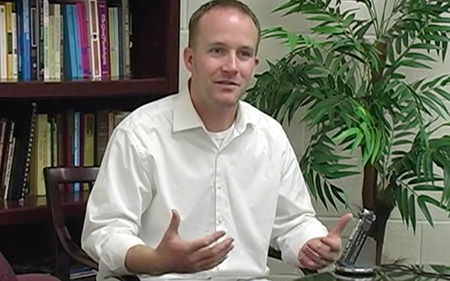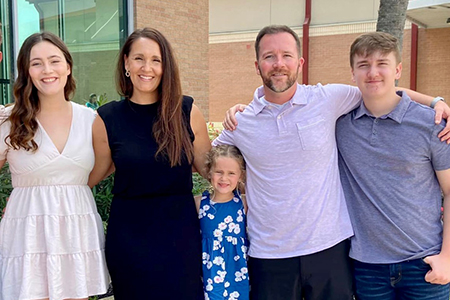Injury ended his Marine mission, while sharing his story began another
U.S. Marine Cpl. Donald Daughenbaugh didn't know what to expect as his convoy left the Green Zone around the Baghdad airport. But it certainly wasn't for a roadside bomb to explode, blowing apart one truck's engine and spraying the driver with shrapnel.
"That was our wake-up call that it was real," Daughenbaugh said. "Welcome to Iraq, Day 1."
Daughenbaugh's story numbers among 25 veteran interviews San Jacinto College has filmed and archived so far with the U.S. Library of Congress. Anyone researching veteran history and firsthand accounts can access these interviews to grasp the realities of war.
Since 2011, San Jac's Veterans Oral History Project has given World War II to Iraq War veterans the chance to share their service experiences — from enlisting and engaging in combat to returning to civilian life.
A night to remember
Daughenbaugh shared his story while a San Jac student in 2012, seven years after a life-altering injury while serving at Forward Operating Base St. Michael in Mahmudiyah, Iraq.
He recalled good memories, like helping children who were plagued with sores after drinking from a polluted irrigation canal. The Marines showed their parents how to sanitize the water by boiling it and adding iodine.
"It changed their outlook on us, what we were doing there," he said.
Daughenbaugh shared hard memories too, like the night patrol Oct. 12, 2004, that ended his service in Iraq.
After setting up a random checkpoint, he and his squad were searching vehicles for weapons and explosives. Instead of stopping, one driver started yelling and hit the gas. Then he pulled an AK-47 from under his seat.
While everyone else ducked behind vehicles and fences, Daughenbaugh had no cover and dropped to a prone position on the ground.
"I saw loud flashes in my direction," he said. "Then it was lights out. I could smell skin burning, and I couldn't talk."
A bullet had broken his jaw, shredding nerves before lodging in his brain. After his squad rushed him back to the base, a helicopter medivacked him to a Baghdad hospital.
The power of story
Today the bullet remains inside Daughenbaugh's skull — too dangerous to remove. With severe nerve damage and a collapsed jaw, he still struggles eating and talking.
Despite post-traumatic stress disorder, Daughenbaugh has not let his injury rule him. After a long recovery, he enrolled at San Jac and finally shared his story publicly through the Veterans Oral History Project.
"When I talk about serving and being away from family, it always brings up the best memories but also some sad ones — losing friends, getting injured, and the long road to recovery," he said.
Sharing helped Daughenbaugh recover some memories and heal emotionally. It also motivated him to continue telling his story.
After earning his associate degree from San Jac in 2015, Daughenbaugh pursued bachelor's and master's degrees in business management/administration. Today he serves as spokesperson and vice president of operations for the Coalition to Salute America's Heroes, which supports wounded veterans and their families.
Wanted: Your firsthand account
San Jac faculty, students, and staff team to record stories through the Veterans Oral History Project.
"Our goal is to preserve history and honor both people associated with San Jac and the rest of the community who served in any branch of the military," Luis Reyes, history professor, said.
This fall Ross Kelsey, director of campus, evening, and weekend services, plans to pick up the interviews again in person and via Zoom.
"An event can be retold numerous times by numerous people, but the impact of hearing firsthand what happened is immeasurable," Kelsey said.
Are you a veteran who lives near San Jac or attended school here? Preserve your story for future generations. For more information, email ross.kelsey@sjcd.edu.
To view Daughenbaugh's and other veterans' interviews, visit bit.ly/3Q3vuDM.
Note: Photos courtesy of Donald Daughenbaugh


